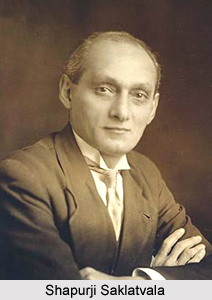 Shapurji Dorabji Saklatvala was one of the Indian Parliamentarians during British time. He was the third Indian elected to the Parliament of the United Kingdom, following Dadabhai Naoroji and Mancherjee Bhownagree. Later, he joined as the member of the Communist Party of Great Britain to serve as a Member of Parliament.
Shapurji Dorabji Saklatvala was one of the Indian Parliamentarians during British time. He was the third Indian elected to the Parliament of the United Kingdom, following Dadabhai Naoroji and Mancherjee Bhownagree. Later, he joined as the member of the Communist Party of Great Britain to serve as a Member of Parliament.
Shapurji Saklatvala was born 28 March 1874 in Mumbai. He was the son of a merchant. He was educated at St. Xavier`s School in Mumbai before moving to St. Xavier`s College for his collegiate education. Earlier, he worked briefly as an iron and coal prospector for Jamshedji Tata before moving to England in 1905. It was at this time that he joined Lincoln`s Inn, although he left before qualifying as a barrister.
Shapurji Dorabji Saklatvala was a sincerely committed socialist and he first joined the Independent Labour Party (ILP) in Manchester in 1909. He came into the global political scenario during the Bolshevik Revolution in Russia
The Bolshevik Revolution in Russia of November 1917 was an inspiration to Shapurji Dorabji Saklatvala. After the establishment of the Communist International in 1919 he became active in attempting to affiliate the Independent Labour Party with that new organization. Saklatvala joined with Emile Burns, Rajani Palme Dutt, J. Walton Newbold, Helen Crawfurd, and others as part of an organized faction called the Left Wing Group of the ILP which was dedicated to this effort. When the affiliation drive by Shapurji Dorabji Saklatvala and the ILP`s left wing ended in failure in the party`s March 1921 National Conference, Saklatvala left the organization with the others in the Left Wing Group to join the new Communist Party of Great Britain. Later he attended the Second Pan African Congress held in Paris in 1921. He attended there as a serious delegate of Communist Party of Great Britain.
In the year October 1922 general election the Communist Party of Great Britain launched its first electoral campaign, putting forward candidates in six districts. Saklatvala ran in the Battersea North district of London, one of two Communists to receive the official endorsement of the Labour Party. Saklatvala was accepted into the Labour Party`s parliamentary caucus but while Newbold applied for the same he was rejected. This did not stop Saklatvala and Newbold from joint activity, however, and the pair attempted to raise the demands of the unemployed and the cause of cheap housing and lower rents whenever possible. Newbold wound up being suspended from the House in May 1923 over his actions with respect to the Lord Curzon ultimatum during the French occupation of the Ruhr Belt of India.
Shapurji Saklatvala was arrested in during the 1926 General Strike following a speech he made in support of striking coal miners and was jailed for two months. He was an active member in the League against Imperialism from the time of its formation in 1927.
Shapurji Saklatvala"s parliamentary career was effectively ended in the 1929, when the general election was happened, as he again lost his seat. He ran again in 1930 in a by-election in the Shettleston electoral district of Glasgow without success, and mounted a final losing campaign in the 1931 general election in Battersea. During the 1935 general election Saklatvala was active in the electoral campaigns of Harry Pollitt and Willie Gallacher.
Shapurji Saklatvala died 16 January 1936. He was 61 years old at the time of his death.




















